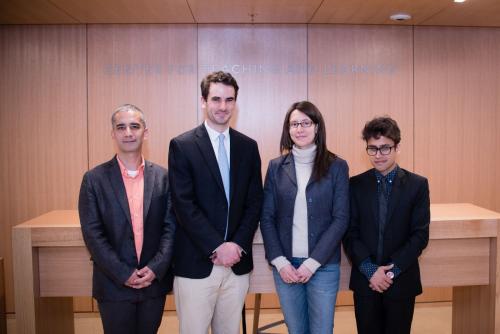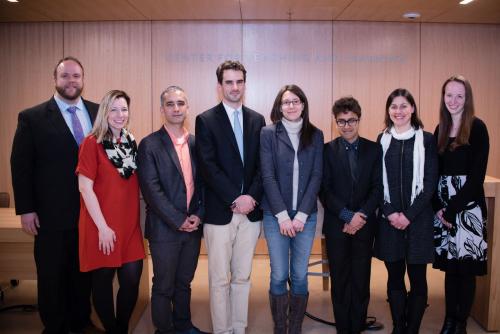The Helmsley Postdoctoral Teaching Program
(2015-2018)

Helmsley 2017-2018 Scholars (L to R): Dr. Marco Bonett-Matiz (Scholar), Dr. Brett C. Smith (Scholar), Dr. Claudia De Grandi (Scholar) and Dr. Savan Kharel (Scholar)

The Helmsley Team (L to R): Dr. Glen Davenport (Evaluator), Jennifer Atchley (Administrative), Dr. Marco Bonett-Matiz (Scholar), Dr. Brett C. Smith (Scholar), Dr. Claudia De Grandi (Scholar) and Dr. Savan Kharel (Scholar), Dr. Jennifer Frederick (Executive Director), Dr. Elizabeth Luoma (Director)
Helmsley Program Overview
The Helmsley Charitable Trust generously supported six Helmsley Postdoctoral Scholars, three in physics and three in math. The Helmsley Scholars pioneered innovative teaching approaches in their respective Yale departments as well as at area partner institutions (Housatonic Community College and University of Bridgeport), employed the use of instructional technology and evidence-based teaching methods. Helmsley Scholars also played a vital role in the planning and facilitating of our STEM Education Seminar & Journal Club series and our annual Summer Institutes on Scientific Teaching to train STEM faculty and future faculty in evidence-based teaching.
For more information: Yale News Press Release on Helmsley Program
Helmsley Capstone Symposium
Yale University, the University of Bridgeport (UB), and Housatonic Community College (HCC) celebrated the culmination of the Helmsley Postdoctoral Teaching Scholars program with a Capstone Symposium on Friday, April 6th, 2018 from 2 p.m. until 4 p.m at Yale’s Poorvu Center for Teaching and Learning. The three institutions have worked together as part of the grant-funded initiative to improve STEM Education in the region for undergraduate students.
Helmsley Innovative Teaching Showcase
Helmsley Scholars were committed to increasing student persistence in science, technology, engineering and math (STEM) fields by employing evidence-based teaching strategies in their introductory courses. Here we showcased innovative teaching pioneered by our Helmsley Scholars:
Claudia De Grandi
Claudia is committed to finding her optimal recipe for teaching physics effectively to a variety of students’ backgrounds via active learning methods and in-class engagement. Read her full bio here.
Claudia’s Random Walk Activity: “Students in PHYS 170 learn ‘by doing’. They discover what a random process is and how it diffuses in space by creating a human ensemble of random walkers in an outdoor space. They flip a coin to decide whether to move forward or backward, and they all move synchronously at the sound of a gong. They can thus appreciate visually the meanings of mean and standard deviation by looking at their classmates spreading in Becton Plaza. Students enjoy this kinesthetic experience of collectively being part of an experiment.” For more information, read Claudia’s full activity instructions here.
Brett Smith
Brett is committed to making introductory math courses more accessible by regularly using peer instruction, just-in-time short response questions, and small group activities in class. Read his full bio here.
Brett’s Math Video Game, Cartes: “In calculus, we study how functions change. Equations give us a way to algebraically understand this change and graphs give us a geometric interpretation. However, many of our students have weak intuition for the connection between equations and graphs. Professor James S. Rolf and I created a video game to help build that intuition.” For more details on the game, see the description here.
